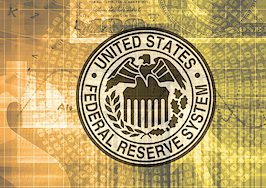- Employment and purchasing data for this month are almost exactly on trend.
- The Fed has indicated it will act if the economy becomes overheated due to new policies.
- More investors and businesses every day are coming to the same conclusion: nobody knows what will happen.
The post-election financial fever has cooled for the moment, rates sliding slightly. Trading in markets since the election cannot be traced to changes in the economy; all have been reactions to prospective changes in policy.
Most people would like markets and the economy to be separate from politics, if only to avoid annoying each other with political discussions, but we’re stuck. As this particular fever began, so it will continue and recur — like malaria, gone for a while and then back to shaking sweats.
Three signs of stability
Economic stability no. 1: today’s employment report for December.
Everything in it is so close to trend that there’s no daylight between trend and actual. Unemployment, underemployment, hours worked, average hourly wages, workforce….
Stability no. 2: In the first week of each month, we get the twin surveys by the old Purchasing Managers’ Association, manufacturing and service sector. These two are near the top of trend, but nothing exciting.
Stability no. 3: The Fed released the minutes of its December meeting. Every set is a dozen pages of thick and carefully crafted Fed politics.
The most important section is always the Fed staff review. The staff completely ignored the election, its possible consequences and market movements since (political comments at the Fed require a higher pay grade).
Staff up-rated its economic forecast slightly, inflation risk balanced (increased by economic improvement, suppressed by strong dollar) and overseas risks tilted to weakness.
The second section recapped comments by “participants” — the dozen regional Fed presidents, meaningless as to policy, but blathering away.
The minutes’ third section summarizes “members” — these are the governors of the Fed, presidential appointments confirmed by the Senate. Hang on every word. In December, the soul of wisdom.
Paraphrased: “Nobody knows what economic policies may be enacted. If they heat the economy more than forecast, then we will react.”
‘Nobody knows’
More investors and businesses every day are coming to the same conclusion: nobody knows. The day after a super-surprise election result, everyone recalibrated economic stimulus to the upside, including potential action by the Fed.
The intent of the new administration is clear — to double the rate of gross domestic product (GDP) growth and to add jobs, and good jobs. Some of the intended means are clear: deregulation, tax reform, tax cuts and renegotiated trade deals.
Two aspects are in doubt: effectiveness and enactment.
The effectiveness of federal policy is always in doubt, or at least in debate. However, this week Lawrence Summers described the Trump plan (Navarro-Ross) as “beyond Voo-doo.”
Summers is a Democrat and therefore suspect. However, the plan has tax and revenue assumptions as or more suspect than any in modern times. Still…who knows?
The post-election market fever has broken because enactment of new policy has fallen into greater doubt with every new day, and every Trump warble and bleat.
Our government was created by founders who feared a “man on a horse” — an individual leader ascendant over democracy. And they feared at least as much the heat and storms in the minds of the people.
Thus a republic, representative government, three co-equal branches, Congress itself divided into two. Ours is a government heavily tilted to inaction, requiring consensus and heroic effort to get anything done.
This is not football. “Winners” of U.S. elections often have little more freedom of action than they had before. Consensus in a polyglot U.S. — if found and understood — rarely holds together long enough to get anything done.
Thus, Congress rarely acts on its own; action requires an adept and horse-trading president. Applications of muscle by the White House…fail.
Obama overplayed his 2008 win, devoting all election momentum to jamming Obamacare through of Congress. The result in the 2010 mid-term election was the largest House reversal since 1948 and put the Tea Party in business. In many ways, that was the end of any chance at a productive presidency.
Trump’s honeymoon may be the first to end before the wedding. He’s not so much overplaying his victory, but fewer people each day understand what he’s playing at all. In Congress the result is chaos. In markets, not so bad, if aimless.
The 10-year T-note in the last two years, now 2.42 percent, off the 2.60 percent peak. The post-election explosion would unwind from here until stimulus policy and effect were more clear, but…the Fed is still coming:
The 2-year T-note is the Fed-predictor. Note no unwind. The next hike is priced-in, but not the next two likely this year.
The Fed has it right. The U.S. economy has performed better in the second half of 2016, the chart below for the last 90 days of 2016. How durable the better performance…I doubt we’ll know until we get there.
Lou Barnes is a mortgage broker based in Boulder, Colorado. He can be reached at lbarnes@pmglending.com.















